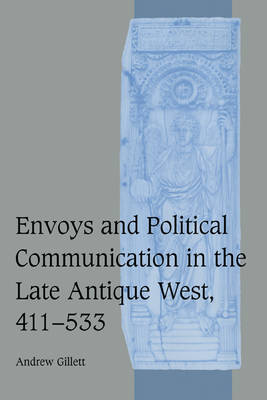
Envoys and Political Communication in the Late Antique West, 411–533
Seiten
2003
Cambridge University Press (Verlag)
978-0-521-81349-5 (ISBN)
Cambridge University Press (Verlag)
978-0-521-81349-5 (ISBN)
This book examines the role of envoys in the period from the establishment of the first 'barbarian kingdoms' in the West, to the eve of Justinian's wars of reconquest. It makes a significant contribution to the developing field of ancient and medieval communication.
Warfare and dislocation are obvious features of the break-up of the late Roman West, but this crucial period of change was characterized also by communication and diplomacy. The great events of the late antique West were determined by the quieter labours of countless envoys, who travelled between emperors, kings, generals, high officials, bishops, provincial councils, and cities. This book examines the role of envoys in the period from the establishment of the first 'barbarian kingdoms' in the West, to the eve of Justinian's wars of re-conquest. It shows how ongoing practices of Roman imperial administration shaped new patterns of political interaction in the novel context of the earliest medieval states. Close analysis of sources with special interest in embassies offers insight into a variety of genres: chronicles, panegyrics, hagiographies, letters and epitaph. This study makes a significant contribution to the developing field of ancient and medieval communications.
Warfare and dislocation are obvious features of the break-up of the late Roman West, but this crucial period of change was characterized also by communication and diplomacy. The great events of the late antique West were determined by the quieter labours of countless envoys, who travelled between emperors, kings, generals, high officials, bishops, provincial councils, and cities. This book examines the role of envoys in the period from the establishment of the first 'barbarian kingdoms' in the West, to the eve of Justinian's wars of re-conquest. It shows how ongoing practices of Roman imperial administration shaped new patterns of political interaction in the novel context of the earliest medieval states. Close analysis of sources with special interest in embassies offers insight into a variety of genres: chronicles, panegyrics, hagiographies, letters and epitaph. This study makes a significant contribution to the developing field of ancient and medieval communications.
Andrew Gillett is Research Fellow in the Department of Ancient History, Macquarie University, Sydney.
Preface; 1. Embassies and political communication in the post-imperial world; 2. The provincial view of Hydatius; 3. The hero as envoy: Sidonium Appollinaris's Panegyric on Avitus; 4. The saint as envoy: fifth and sixth century Latin bishops' Lives; 5. Cassiodorus and Senarius; 6. Negotium Agendum; Conclusion; Appendices; Bibliography.
| Erscheint lt. Verlag | 28.8.2003 |
|---|---|
| Reihe/Serie | Cambridge Studies in Medieval Life and Thought: Fourth Series |
| Zusatzinfo | 3 Tables, unspecified; 2 Maps |
| Verlagsort | Cambridge |
| Sprache | englisch |
| Maße | 152 x 229 mm |
| Gewicht | 733 g |
| Themenwelt | Geschichte ► Allgemeine Geschichte ► Vor- und Frühgeschichte |
| Geisteswissenschaften ► Geschichte ► Regional- / Ländergeschichte | |
| Geisteswissenschaften ► Sprach- / Literaturwissenschaft ► Anglistik / Amerikanistik | |
| Geisteswissenschaften ► Sprach- / Literaturwissenschaft ► Sprachwissenschaft | |
| Sozialwissenschaften ► Politik / Verwaltung ► Staat / Verwaltung | |
| ISBN-10 | 0-521-81349-2 / 0521813492 |
| ISBN-13 | 978-0-521-81349-5 / 9780521813495 |
| Zustand | Neuware |
| Haben Sie eine Frage zum Produkt? |
Mehr entdecken
aus dem Bereich
aus dem Bereich
auf den Spuren der frühen Zivilisationen
Buch | Hardcover (2023)
C.H.Beck (Verlag)
20,00 €
Konzepte – Methoden – Theorien
Buch | Softcover (2024)
UTB (Verlag)
39,90 €
Was Pompeji über uns erzählt
Buch | Hardcover (2023)
Propyläen (Verlag)
32,00 €


